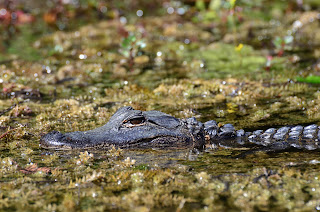http://evergladesareatours.com/home.htm
It took about 2 and a half hours to drive from my brother's house in Palm Beach Gardens to JT's where we met our guide Darlene. We followed Darlene to the Turner River put in off the Tamiami Trail in Big Cypress National Preserve. We weren't in our kayak more that 5 minutes when we met the "King of the Swamp" basking in the sun on the riverbank.
We pushed our way through dense mats of Hydrilla, an invasive species now clogging the waterways of the Everglades, upriver to Cypress Domes. Here towering Cypress grow on islands within the swamp. Their branches are draped with Bromeliads, mosses and orchids. We were lucky to see some of the orchids in bloom including a Clamshell Orchid
and this not so aptly named Dingy Flowered Star Orchid.
While Marc was photographing the orchids, Darlene spotted an animal amongst the cypress. She described it as golden with a rounded rump. She thought it may have been a Florida Panther! But when we tried to get a better look it had disappeared. Just knowing that these rare cats roam here is exciting enough for me. The Cypress domes are tranquil oasis offering a cool respite from the intense sun.
On the way back we encountered a Little Blue (front) and Tricolor (back) Heron fishing from the mat of Hydrilla.
The Tricolor Heron let us approach closely so Marc was able to get a great photo.
The wind ruffled the feathers on his neck making it look like he was wearing a fancy boa. We passed by a pair of Ospreys nesting in the top of a Cypress Tree. One flew off as we approached. Osprey mate for life and both the female and male raise the chicks. Females tend to be larger than males and have brown spots on their chests. Their diet consists mainly of fish.
A White Ibis was perched on one leg in a tree nearby. Some ornithologists believe that birds may sleep on one leg,
essentially turning half of the brain off to rest, and balancing on the leg
which is connected to the part of the brain that is awake. Sounds a bit hokey to me. A more plausible explanation may be that by standing on one leg a bird reduces half the amount of heat lost through unfeathered limbs.
Green Herons like to hide in the thick vegetation making it difficult to get a good view of one. We were lucky in that one chose to come out in the open showing off his beautiful emerald plumage.
Two Common Moorhens were attempting to hide on us but Marc was able to sneak a photo of them.
Floating in the water were tiny yellow flowers. They are Bladderworts and are carnivorous. They capture small organisms such as insects, larvae and tadpoles in bladder-like traps. This damselfly did not seem to be too concerned.
We returned to the put in and continued downriver, paddling under a bridge over the Tamiami Trail (Route 41). We entered an area where female alligators nest. Unlike crocodiles, female alligators tend to their babies after they hatch. They keep a close eye out for danger.
A baby was lounging in a nearby tree and we were careful not to approach too closely in fear that mom may lunge at us.
A non-venomous Water Snake was coiled up in the Mangroves.
We entered a mangrove tunnel. It was so narrow that you couldn't paddle. You had to pull yourself through by grabbing on to branches, taking care not to damage the mangroves.
Red Mangroves grew along the shore. Their stilt-like roots stabilize shorelines and provide a nursery for fish and crustaceans. Red Mangroves can also reproduce by dropping air roots or propagules which can take root
and start a new tree. As we passed underneath, the propagules brushed Marc's sunglasses off his head into the brackish water, never to be found again. The Mangrove tunnel opened up into a Sawgrass Prairie. The "Prairie' stretched as far as the eye could see with a few palm trees along the horizon.
This is what Southern Florida looked like before the Spaniards arrived. It must have been a formidable place but the Indians lived here in harmony with the environment. It was getting late and time to head back. We had a great day exploring the wild beauty of the Florida Everglades!

















No comments:
Post a Comment